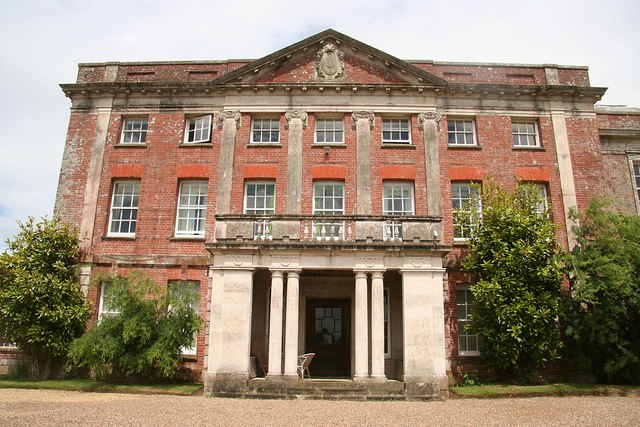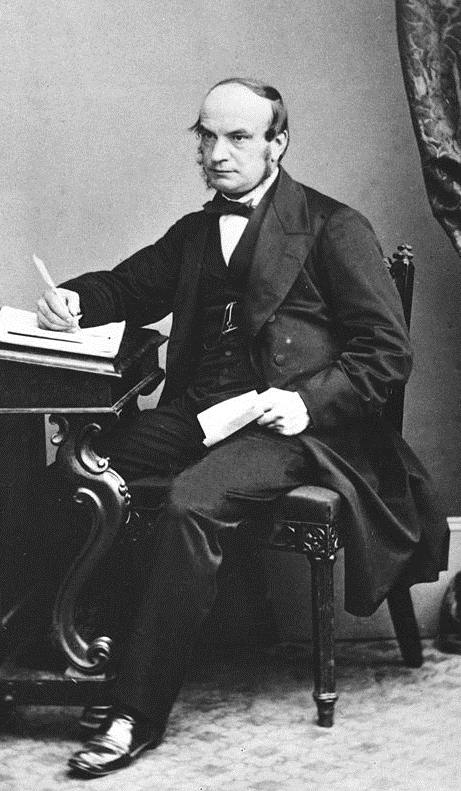|
Isaac Newton Wallop, 5th Earl Of Portsmouth
Isaac Newton Wallop, 5th Earl of Portsmouth DL JP(11 January 1825 – 4 October 1891) was a British Peer and the son of Newton Fellowes, 4th Earl of Portsmouth and Lady Catharine Fortescue. Early life Portsmouth was born as Isaac Newton Fellowes, but later resumed the family surname and arms of Wallop without Royal Licence when he succeeded to the peerage in 1854. He was the son of Newton Fellowes, 4th Earl of Portsmouth and Lady Catharine Fortescue, daughter of Hugh Fortescue, 1st Earl Fortescue. He was educated at Rugby School and matriculated at Trinity College, Cambridge, where he received a Master of Arts degree. The Newton Papers In 1872 Lord Portsmouth donated to his alma mater, Trinity College, Cambridge, a vast collection of papers by Sir Isaac Newton which had descended through Newton's great-niece Catherine Conduitt, daughter of John Conduitt and Catherine Barton, into the Wallop family by her marriage to John Wallop, Viscount Lymington. A committee chaired by ... [...More Info...] [...Related Items...] OR: [Wikipedia] [Google] [Baidu] |
The Right Honourable
''The Right Honourable'' ( abbreviation: ''Rt Hon.'' or variations) is an honorific style traditionally applied to certain persons and collective bodies in the United Kingdom, the former British Empire and the Commonwealth of Nations. The term is predominantly used today as a style associated with the holding of certain senior public offices in the United Kingdom, Canada, New Zealand, and to a lesser extent, Australia. ''Right'' in this context is an adverb meaning 'very' or 'fully'. Grammatically, ''The Right Honourable'' is an adjectival phrase which gives information about a person. As such, it is not considered correct to apply it in direct address, nor to use it on its own as a title in place of a name; but rather it is used in the third person along with a name or noun to be modified. ''Right'' may be abbreviated to ''Rt'', and ''Honourable'' to ''Hon.'', or both. ''The'' is sometimes dropped in written abbreviated form, but is always pronounced. Countries with common or ... [...More Info...] [...Related Items...] OR: [Wikipedia] [Google] [Baidu] |
Isaac Newton
Sir Isaac Newton (25 December 1642 – 20 March 1726/27) was an English mathematician, physicist, astronomer, alchemist, theologian, and author (described in his time as a "natural philosopher"), widely recognised as one of the greatest mathematicians and physicists and among the most influential scientists of all time. He was a key figure in the philosophical revolution known as the Enlightenment. His book (''Mathematical Principles of Natural Philosophy''), first published in 1687, established classical mechanics. Newton also made seminal contributions to optics, and shares credit with German mathematician Gottfried Wilhelm Leibniz for developing infinitesimal calculus. In the , Newton formulated the laws of motion and universal gravitation that formed the dominant scientific viewpoint for centuries until it was superseded by the theory of relativity. Newton used his mathematical description of gravity to derive Kepler's laws of planetary motion, account for ... [...More Info...] [...Related Items...] OR: [Wikipedia] [Google] [Baidu] |
Charles Milnes Gaskell
Charles George Milnes Gaskell PC (23 January 1842 – 9 January 1919) was an English lawyer and Liberal Party politician. Milnes Gaskell was born in London, the son of James Milnes Gaskell M.P., of Thornes House, Wakefield, Yorkshire, and Wenlock Abbey, Much Wenlock, Shropshire, and his wife Mary Williams-Wynn. He was educated at Eton College and Trinity College, Cambridge, where he graduated BA in 1863 and MA in 1866, and was called to the bar at Inner Temple in 1866. He was a J.P. and Deputy Lieutenant for the West Riding of Yorkshire and was Chairman of the West Riding County Council from 1893 to 1910. Milnes Gaskell stood unsuccessfully in Pontefract in 1868 and at Knaresborough in 1881. At the 1885 general election he was elected as the first Member of Parliament for Morley and held it until he retired from parliament at the 1892 general election. He was awarded an Honorary LLD by the University of Leeds in 1904. and was made a Privy Counsellor in 19 ... [...More Info...] [...Related Items...] OR: [Wikipedia] [Google] [Baidu] |
Member Of Parliament
A member of parliament (MP) is the representative in parliament of the people who live in their electoral district. In many countries with bicameral parliaments, this term refers only to members of the lower house since upper house members often have a different title. The terms congressman/congresswoman or deputy are equivalent terms used in other jurisdictions. The term parliamentarian is also sometimes used for members of parliament, but this may also be used to refer to unelected government officials with specific roles in a parliament and other expert advisers on parliamentary procedure such as the Senate Parliamentarian in the United States. The term is also used to the characteristic of performing the duties of a member of a legislature, for example: "The two party leaders often disagreed on issues, but both were excellent parliamentarians and cooperated to get many good things done." Members of parliament typically form parliamentary groups, sometimes called caucuse ... [...More Info...] [...Related Items...] OR: [Wikipedia] [Google] [Baidu] |
William Brampton Gurdon
Sir William Brampton Gurdon (5 September 1840 – 31 May 1910)Obituary ''London Evening Standard''] was a British who became a politician. Early life Gurdon was the youngest son of Brampton Gurdon (MP for West Norfolk) of[...More Info...] [...Related Items...] OR: [Wikipedia] [Google] [Baidu] |
Tapeley
Tapeley is a historic estate in the parish of Westleigh in North Devon, England. The present mansion house known as Tapeley Park is a grade II* listed country house, built or enlarged from an existing structure in about 1704, remodeled in the 19th century and again in the early 20th century when pilasters, portico, pediment and parapet were added to create a Queen Anne style building. In the mid 19th century the estate was inherited from the Clevland family by William Langham Christie of Glyndebourne in Sussex. His grandson was John Christie (born 1882), the founder of Glyndebourne Opera Festival, who bequeathed Tapeley to his daughter Rosamund Christie (1933–1988), who passed it onto her nephew Hector Christie (born 1963), who briefly turned it into a hippie commune. In 2011, Tapeley Park was the subject of an episode of the Channel 4 television programme '' Country House Rescue'', presented by the hotelier Ruth Watson, who advised on restoring the estate to a sou ... [...More Info...] [...Related Items...] OR: [Wikipedia] [Google] [Baidu] |
Bernard Edward Howard, 12th Duke Of Norfolk
Bernard Edward Howard, 12th Duke of Norfolk, (21 November 1765 – 16 March 1842) was a British peer. Early life Howard was the son of Henry Howard (1713–1787) by his wife Juliana Molyneux, daughter of Molyneux baronets, Sir William Molyneux, 6th Baronet (died 1781), of Teversall, Nottinghamshire, High Sheriff of Nottinghamshire 1737. Career Bernard Howard succeeded to the title of Duke of Norfolk in 1815 upon the death of his cousin Charles Howard, 11th Duke of Norfolk. An ardent Roman Catholic, like most of his family, he strongly supported Catholic Emancipation, and gave offence to his Protestant neighbours by giving a banquet to celebrate the passage of the Roman Catholic Relief Act 1829. He was elected a Foreign Honorary Member of the American Academy of Arts and Sciences in 1803. In 1834, the Duke of Norfolk was invested by King William IV of the United Kingdom, William IV into the Order of the Garter. Personal life On 23 April 1789, he married Lady Elizabeth Belasys ... [...More Info...] [...Related Items...] OR: [Wikipedia] [Google] [Baidu] |
Henry John George Herbert, 3rd Earl Of Carnarvon
Henry John George Herbert, 3rd Earl of Carnarvon, FRS (8 June 1800 – 10 December 1849), styled Lord Porchester from 1811 to 1833, was a British writer, traveller, nobleman, and politician. Background and education Herbert was born in London, the eldest son of Henry Herbert, 2nd Earl of Carnarvon and Elizabeth "Kitty" Acland, daughter of John Dyke Acland of Pixton Park in Somerset. He was educated at Eton College and Christ Church, Oxford. Public life In 1831, Porchester was elected to the House of Commons for Wootton Bassett as a Tory, a seat he held until the following year when the constituency was abolished by the Great Reform Act. In 1833 he succeeded his father in the earldom and entered the House of Lords. He was elected a Fellow of the Royal Society in 1841. It was during Carnarvon's lifetime that the family seat of Highclere Castle was redesigned and rebuilt by Sir Charles Barry into a Victorian mansion. Cricket Herbert played first-class cricket in 182 ... [...More Info...] [...Related Items...] OR: [Wikipedia] [Google] [Baidu] |
University Of Cambridge
, mottoeng = Literal: From here, light and sacred draughts. Non literal: From this place, we gain enlightenment and precious knowledge. , established = , other_name = The Chancellor, Masters and Scholars of the University of Cambridge , type = Public research university , endowment = £7.121 billion (including colleges) , budget = £2.308 billion (excluding colleges) , chancellor = The Lord Sainsbury of Turville , vice_chancellor = Anthony Freeling , students = 24,450 (2020) , undergrad = 12,850 (2020) , postgrad = 11,600 (2020) , city = Cambridge , country = England , campus_type = , sporting_affiliations = The Sporting Blue , colours = Cambridge Blue , website = , logo = University of Cambridge logo ... [...More Info...] [...Related Items...] OR: [Wikipedia] [Google] [Baidu] |
Sir George Stokes, 1st Baronet
Sir George Gabriel Stokes, 1st Baronet, (; 13 August 1819 – 1 February 1903) was an Irish English physicist and mathematician. Born in County Sligo, Ireland, Stokes spent all of his career at the University of Cambridge, where he was the Lucasian Professor of Mathematics from 1849 until his death in 1903. As a physicist, Stokes made seminal contributions to fluid mechanics, including the Navier–Stokes equations; and to physical optics, with notable works on polarization and fluorescence. As a mathematician, he popularised "Stokes' theorem" in vector calculus and contributed to the theory of asymptotic expansions. Stokes, along with Felix Hoppe-Seyler, first demonstrated the oxygen transport function of hemoglobin and showed color changes produced by aeration of hemoglobin solutions. Stokes was made a baronet by the British monarch in 1889. In 1893 he received the Royal Society's Copley Medal, then the most prestigious scientific prize in the world, "for his researches and ... [...More Info...] [...Related Items...] OR: [Wikipedia] [Google] [Baidu] |
John Couch Adams
John Couch Adams (; 5 June 1819 – 21 January 1892) was a British mathematician and astronomer. He was born in Laneast, near Launceston, Cornwall, and died in Cambridge. His most famous achievement was predicting the existence and position of Neptune, using only mathematics. The calculations were made to explain discrepancies with Uranus's orbit and the laws of Kepler and Newton. At the same time, but unknown to each other, the same calculations were made by Urbain Le Verrier. Le Verrier would send his coordinates to Berlin Observatory astronomer Johann Gottfried Galle, who confirmed the existence of the planet on 23 September 1846, finding it within 1° of Le Verrier's predicted location. (There was, and to some extent still is, some controversy over the apportionment of credit for the discovery; see Discovery of Neptune.) Adams was Lowndean Professor in the University of Cambridge from 1859 until his death. He won the Gold Medal of the Royal Astronomical Society in 1866. In ... [...More Info...] [...Related Items...] OR: [Wikipedia] [Google] [Baidu] |
_(cropped).jpg)




